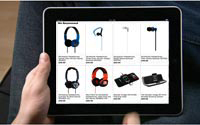Tablets More M-Commerce-Friendly Than Phones
- by Mark Walsh @markfwal, May 13, 2013
 Nearly a third (30%) of U.S. tablet owners have made a purchase on their devices, compared to only 13% of mobile phone users. That finding on mobile
shopping attributed the higher share of sales on tablets to their larger screens, which make them more PC-like and conducive to online buying.
Nearly a third (30%) of U.S. tablet owners have made a purchase on their devices, compared to only 13% of mobile phone users. That finding on mobile
shopping attributed the higher share of sales on tablets to their larger screens, which make them more PC-like and conducive to online buying.
The Forrester report doesn’t yet include tablet-based transactions in its forecast for mobile retail sales. It projects that m-commerce -- on smartphones only -- will more than double from $12 billion this year to $27 billion by 2016. While growing quickly, mobile retail will remain a small portion of total U.S. e-commerce sales -- rising from 5% to 8% in the next three years.
What’s holding back higher retail spending on smartphones?
Non-optimized mobile sites, concerns about mobile payments and often patchy network connections translate into low conversion rates. The average rate for mobile sites is 1% compared to 2% to 3% on a PC. For the most part, people are using devices to research purchases, including reading customer product reviews, locating a store or checking store hours
A separate study released by eMarketer last month estimated that tablets this year will drive the bulk of U.S. m-commerce sales (excluding travel), with smartphones accounting for 35%. By 2017, tablets’ share of m-commerce spending will rise to 71.5%, compared to 27% on smartphones. Wider device adoption will play a role in that growth, with the 18% of U.S. tablet owners forecast to reach 45% by 2016, according to Forrester.
When it comes to the types of purchases people are making via mobile, preferences are similar across smartphones and tablets. These include apparel, airline tickets, and booking hotel reservations. Not surprisingly, e-books are the most popular retail category on tablets, with 43% of tablet owners buying at least one in the last three months.
Consumers generally opt to shop through retailer’s mobile Web sites than apps. But when it comes to online-only retailers, apps have the edge, with 36% of mobile shoppers using them versus 31% who favor their mobile sites.
From a demographic perspective, mobile shoppers (on phones or tablets) skew young, male and affluent. Two out of three have a full-time job, 40% earn more than $100,000 per year, and one-third have children under 18 living at home. Their average age is 36.
The Forrester report notes that retailers have mostly taken a conservative approach to mobile. Its prior State of Retailing Online report found 18 of 43 retailers surveyed had no full-time staff dedicated to mobile, and half spent less than $100,000 on their annual smartphone investment plan in fiscal year 2011.
The firm advises retailers to help educate consumers -- especially older, less tech-savvy customers -- about mobile shopping while in physical store locations. Mobile retail operations should also take advantage of mobile-specific features like GPS, accelerometers and Near Field Communication, as well as creating apps that can be used as loyalty cards.



Most of these studies on "m-commerce" are misleading. Tablets are not mobile devices - they are mostly used as laptop replacements with a better convenience factor. To call them mobile devices and have them as part of an "M-commerce" segment confuses what they are and how they are used.
9 out of 10 tablets don't have a cellular connection. Which means they need to be stationary and hooked into a WiFi connection to communicate. Plus, as this study points out, consumers tend to opt for the website rather than an app. Sounds a lot more like a PC than a smartphone.
Here are some simple observational experiments. Have you seen a jogger running with a tablet? Or a shopper in the store using a tablet to scan products? Or a Starbucks customer presenting their tablet for payment?
Two suggestions:
1) studies/reports should stop lumping tablets and smartphones into the "mobile" devices category
2) "M-commerce" should be reflect the new types of consumer behavior that is really driven by some sort of mobile component. Otherwise it's standard ecommerce.